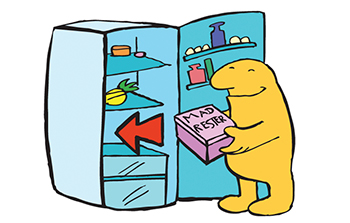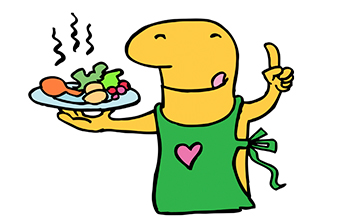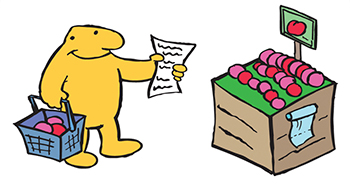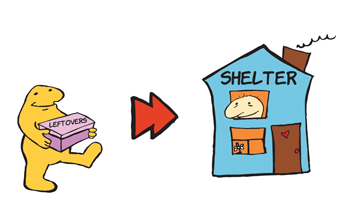Use the food that you already have in your refrigerator, your kitchen cupboards and in your freezer. Less food waste means that you’ll save your money, you’ll save your time – and at the same time you’ll save the planet.
Have a flow in your fridge, your freezer and your kitchen cup doesn’t boards, so the older foods are placed at the front – and preferably at your eye level, so you are constantly reminded to use up that food.
Have a central place to store your leftovers and use your leftovers in new meals, no matter if it’s a weekday, weekend or a holiday like Christmas/Easter/Thanksgiving/Hanukkah/Eid/etc. Store your leftovers in a central place in your refrigerator, so you always remember to use them.

Leftovers is free bonus food – create a new attitude towards your leftovers. When you use your leftovers, you save a trip to the supermarket, you save your time and you save your money. A leftover salmon today can turn into a salmon salad tomorrow. A leftover chicken can be used in an omelet. A leftover cream can be frozen and used in soups or stews.
Have the Empty Your Fridge Days to use up all your leftovers. Sunday is usually a good day to cook meals with leftovers. Once every month, have an Empty Your Freezer Day. Also, be sure to have the Empty Your Fridge/Freezer Days before holidays like Christmas/Easter/Thanksgiving/Hanukkah/Eid/etc. to make new room for all the good leftovers.
Make sure that your meal with leftovers look aesthetically pleasing – just because it’s leftovers, it doesn’t mean that your plate should look like trash. The meal should always look inviting.
Your refrigerator is not your garbage bin – make sure that no old leftovers are left to die in the back of your fridge. Remember not to overstuff your fridge. If you overstuff your fridge, it will be more difficult for the cold air to circulate in the fridge – and thus keeping the food fresh. Keep good hygiene and regularly clean your fridge and your freezer.
Stop producing the UFO’s – yes, the Unidentified Frozen Objects in your freezer. UFO’s are all the good leftovers that you freeze and then forget all about them for a year or two. After a year or two, you usually throw them out. You time, your money, good food and your electricity bills all for nothing. Prevent UFO’s by freezing the leftovers in smaller portions, and always have a system to note what you have frozen and when. And remember to use the food in your freezer, so your freezer won’t become the last stop before the garbage bin.
Learn to store the food properly – apples, pears, bananas and oranges should not be in contact with each other, otherwise they will ripen faster. Tomatoes, avocados, potatoes, bananas and citrus fruits must be stored outside the refrigerator. Use packaging only suitable for food.
Learn about the date labeling – the “Use By” label is used on fresh meat, fresh fish, fresh chicken, etc. It’s not advisable to eat the food after the expiration of “Use By” date. Meanwhile, the “Best Before” label is used on pasta, rice, cookies, chocolate, corn flakes, etc. You can eat the food after the expiration of “Best Before” date. In other words, “Best Before” doesn’t mean “Toxic After”.
Don’t cook for 11 if you are 8 people for dinner – many people constantly tend to cook and serve too much food. A good idea is to cook 30% less food and to calculate portion sizes before making the food.
Use smaller size of plates and dishes – for the past 20 years, the sizes of plates have grown all over the world. By using a smaller size of plates and dishes on the dinner table, you’ll make sure that you’ll waste less food. The bigger the plate is, the more you are tempted to fill it up with food. A smaller size of plate also prevents overeating.

More is not always better – focus on quality of food, rather than quantity. When you buy food of better quality, you’ll also tend to waste less. It’s way easier to waste cheap junk food than more expensive organic food.
The food should not sweat on the dinner table for many hours – no need to put all the food on the dinner table at once. Serve gradually to keep the food fresh.
Don’t mix things when saving your leftovers – many dishes are better if not mixed up, so they can be stored better. Store vegetables and meats separately for optimal reuse.
Save your food – most of your surplus food and the leftovers can be frozen. Leftovers of many dishes can be and frozen. Bread can be sliced up and frozen. Even cream, herbs, vegetables, fruits, hard cheese can be frozen as well. But remember to keep track of your frozen leftovers, and remember to use them. Also, freeze in smaller portions for better convenience and optimal reuse.
Have a great number of food storage containers to store your leftovers. A good advice is also to have a roll of fridge and freezer bags located directly in your refrigerator. This will automatically remind you to use them and save your food.
Don’t eat moldy food – if there is mold on one side of the bread, the entire bread has to go. Yet, some moldy foods can be eaten while cutting off the mold, such as hard cheese or carrots.
Keep a Food Waste Diary during holidays like Christmas/Easter/Thanksgiving/Hanukkah/Eid/etc. to track how much food you throw out and why. Thus, you’ll learn to do better and better next time the holidays are approaching.
Share your surplus food with your neighbor if you’ve cooked too much food. After a big dinner, give homemade doggybags to your guests. If you have fruit trees in your garden, but no time to pluck the fruits, use social media to engage your friends to come and help you to pluck the fruits. Bonus: You’ll get happier friends and neighbors.
Regrow your food – you can regrow celery, garlic, spring onions, cabbage, salad, herbs, fennel, coriander, carrots, leeks and much more – right in your own home. Join the regrow trend and grow your own free food.
Planning is a good weapon in the fight against food waste. Before you go grocery shopping, make sure to make a meal plan, a shopping list or even easier: Take your smartphone and take a picture of the content of your fridge. Thus, you’ll have am easy reminder of what you already have and what you’ll need to buy.
Never buy an empty stomach – snap a banana or a biscuit before going grocery shopping. If you go grocery shopping on an empty stomach, you’ll risk buying more food than you actually need.
Control your inner hamster while grocery shopping. Be in control of the bulk discounts, instead of letting the bulk discounts controlling you.

Choose smaller size of shopping carts and shopping baskets – a large shopping cart or a shopping basket will automatically make you buy more food than you actually need. If you want to buy just the amount of food you need, choose a smaller shopping cart or a smaller shopping basket. Remember to carry your shopping basket in your hand, instead of pulling it behind you on wheels. When you carry the shopping basket in your hand, you’ll have better control of the amount of food that you buy, because the shopping basket gets heavier and heavier.
Buy the food close to it’s expiration date – its’ often much cheaper. You’ll also help the supermarkets to reduce their food waste. Take the milk closest to its expiration date if you know that you’ll use it up soon.
Use bulk discounts with caution – use the bulk discounts only if you are sure that you are going to use all the food, otherwise it will be your money down the drain.
Ugly and wonky taste just the same – buy ugly and wonky fruits and vegetables. Just because the cucumber is bendy, it tastes just the same as a straight one. And remember to buy single bananas – the single bananas need more love.
Buy food for several days and have a good a plan to use the leftovers. Plan for leftovers while buying the food. For example, yesterday’s leftover salmon can turn into today’s salmon salad.
Keep your food fresh – make sure to get home quickly after buying your groceries. Keep the food in cooling bags and don’t let your groceries sweat in a warm car for hours.
Buffet is a food waste trap – order portion servings (a la carte) instead of a buffet.
Take all you can eat, but eat all you take – if buffet is the only option, it’s a good idea to start with small tastings. The first time you go to the buffet, remember to take small samples on your plate. So the next time you go to the buffet, you’ll know which dishes you prefer to eat.
Use small plates at the buffet and remember to put a bit less on your plate. You are welcome to visit the buffet several times. A plate of smaller size also prevents you from the danger of overeating.
Ask the waiter about the size of the portion before you get portion servings (a la carte). If you are unsure whether or not you can eat the whole plate, consult with the waiter about the size of the portion serving.
Order two starters instead of a starter and a main course if you’re not sure about your appetite. If you’re still hungry, you can always order some more.
Ask for a doggybag if you are unable to finish your food. You’ve paid for your food, it is your right to take it home – and to reduce food waste.
Become a Food Hero and help donating the good surplus food to food insecure people. Encourage your local supermarket, bakery, food producer, farmer and such and to donate their good surplus food to charities.
